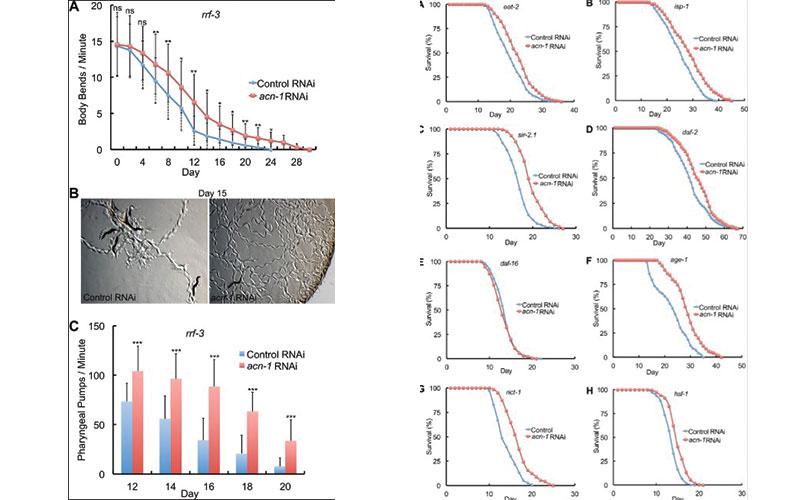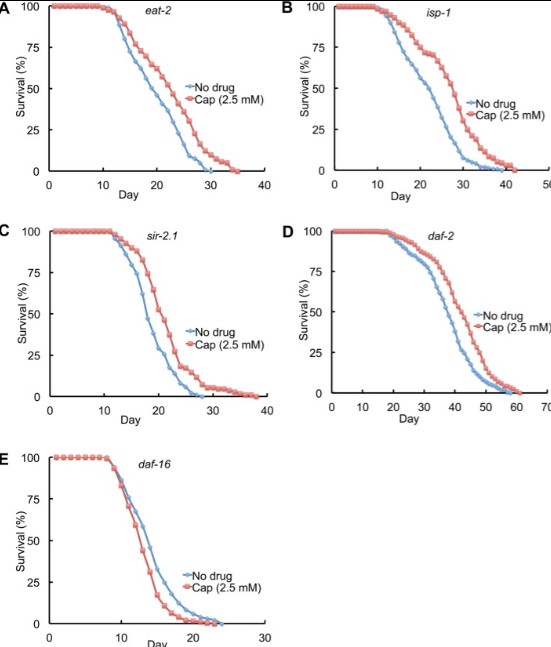
Abstract
Animal aging is characterized by progressive, degenerative changes in many organ systems. Because age-related degeneration is a major contributor to disability and death in humans, treatments that delay age-related degeneration are desirable. However, no drugs that delay normal human aging are currently available. To identify drugs that delay age-related degeneration, we used the powerful Caenorhabditis elegans model system to screen for FDA-approved drugs that can extend the adult lifespan of worms. Here we show that captopril extended mean lifespan. Captopril is an angiotensin-converting enzyme (ACE) inhibitor used to treat high blood pressure in humans. To explore the mechanism of captopril, we analyzed the acn-1 gene that encodes the C. elegans homolog of ACE. Reducing the activity of acn-1 extended the mean life span. Furthermore, reducing the activity of acn-1 delayed age-related degenerative changes and increased stress resistance, indicating that acn-1 influences aging. Captopril could not further extend the lifespan of animals with reduced acn-1, suggesting they function in the same pathway; we propose that captopril inhibits acn-1 to extend lifespan. To define the relationship with previously characterized longevity pathways, we analyzed mutant animals. The lifespan extension caused by reducing the activity of acn-1 was additive with caloric restriction and mitochondrial insufficiency, and did not require sir-2.1, hsf-1 or rict-1, suggesting that acn-1 functions by a distinct mechanism. The interactions with the insulin/IGF-1 pathway were complex, since the lifespan extensions caused by captopril and reducing acn-1 activity were additive with daf-2 and age-1 but required daf-16. Captopril treatment and reducing acn-1 activity caused similar effects in a wide range of genetic backgrounds, consistent with the model that they act by the same mechanism. These results identify a new drug and a new gene that can extend the lifespan of worms and suggest new therapeutic strategies for addressing age-related degenerative changes.
Conflict of interest statement
The authors have declared that no competing interests exist.
Figures








Similar articles
- Control of aging by the renin-angiotensin system: a review of C. elegans, Drosophila, and mammals.Egan BM, Scharf A, Pohl F, Kornfeld K.Front Pharmacol. 2022 Sep 14;13:938650. doi: 10.3389/fphar.2022.938650. eCollection 2022.PMID: 36188619 Free PMC article. Review.
- HSF-1 and SIR-2.1 linked insulin-like signaling is involved in goji berry (Lycium spp.) extracts promoting lifespan extension of Caenorhabditis elegans.Xiong L , Deng N , Zheng B , Li T , Liu RH .Food Funct. 2021 Sep 7;12(17):7851-7866. doi: 10.1039/d0fo03300f. Epub 2021 Jul 9.PMID: 34240728
- Methyl 3,4-Dihydroxybenzoate Enhances Resistance to Oxidative Stressors and Lifespan in C. elegans Partially via daf-2/daf-16.Mi XN, Wang LF, Hu Y, Pan JP, Xin YR, Wang JH, Geng HJ, Hu SH, Gao Q, Luo HM.Int J Mol Sci. 2018 Jun 5;19(6):1670. doi: 10.3390/ijms19061670.PMID: 29874838 Free PMC article.
- Emodin extends lifespan of Caenorhabditis elegans through insulin/IGF-1 signaling pathway depending on DAF-16 and SIR-2.1.Zhao X, Lu L, Qi Y, Li M, Zhou L.Biosci Biotechnol Biochem. 2017 Oct;81(10):1908-1916. doi: 10.1080/09168451.2017.1365592. Epub 2017 Aug 23.PMID: 28831863
- Worming pathways to and from DAF-16/FOXO.Mukhopadhyay A, Oh SW, Tissenbaum HA.Exp Gerontol. 2006 Oct;41(10):928-34. doi: 10.1016/j.exger.2006.05.020. Epub 2006 Jul 12.PMID: 16839734 Review.
Cited by
- Potential Active Marine Peptides as Anti-Aging Drugs or Drug Candidates.Yang H, Zhang Q, Zhang B, Zhao Y, Wang N.Mar Drugs. 2023 Feb 23;21(3):144. doi: 10.3390/md21030144.PMID: 36976193 Free PMC article. Review.
- Current Trends and Approaches to the Search for Genetic Determinants of Aging and Longevity.Kunizheva SS, Volobaev VP, Plotnikova MY, Kupriyanova DA, Kuznetsova IL, Tyazhelova TV, Rogaev EI.Russ J Genet. 2022;58(12):1427-1443. doi: 10.1134/S1022795422120067. Epub 2022 Dec 28.PMID: 36590179 Free PMC article.
- Captopril Alleviates Chondrocyte Senescence in DOCA-Salt Hypertensive Rats Associated with Gut Microbiome Alteration.Chan LC, Zhang Y, Kuang X, Koohi-Moghadam M, Wu H, Lam TYC, Chiou J, Wen C.Cells. 2022 Oct 10;11(19):3173. doi: 10.3390/cells11193173.PMID: 36231135 Free PMC article.
- Control of aging by the renin-angiotensin system: a review of C. elegans, Drosophila, and mammals.Egan BM, Scharf A, Pohl F, Kornfeld K.Front Pharmacol. 2022 Sep 14;13:938650. doi: 10.3389/fphar.2022.938650. eCollection 2022.PMID: 36188619 Free PMC article. Review.
- Lifespan benefits for the combination of rapamycin plus acarbose and for captopril in genetically heterogeneous mice.Strong R, Miller RA, Cheng CJ, Nelson JF, Gelfond J, Allani SK, Diaz V, Dorigatti AO, Dorigatti J, Fernandez E, Galecki A, Ginsburg B, Hamilton KL, Javors MA, Kornfeld K, Kaeberlein M, Kumar S, Lombard DB, Lopez-Cruzan M, Miller BF, Rabinovitch P, Reifsnyder P, Rosenthal NA, Bogue MA, Salmon AB, Suh Y, Verdin E, Weissbach H, Newman J, Maccchiarini F, Harrison DE.Aging Cell. 2022 Dec;21(12):e13724. doi: 10.1111/acel.13724. Epub 2022 Sep 30.PMID: 36179270 Free PMC article.




